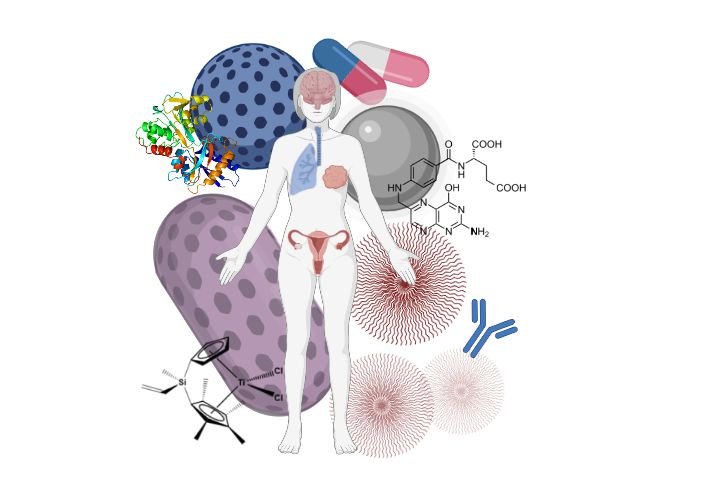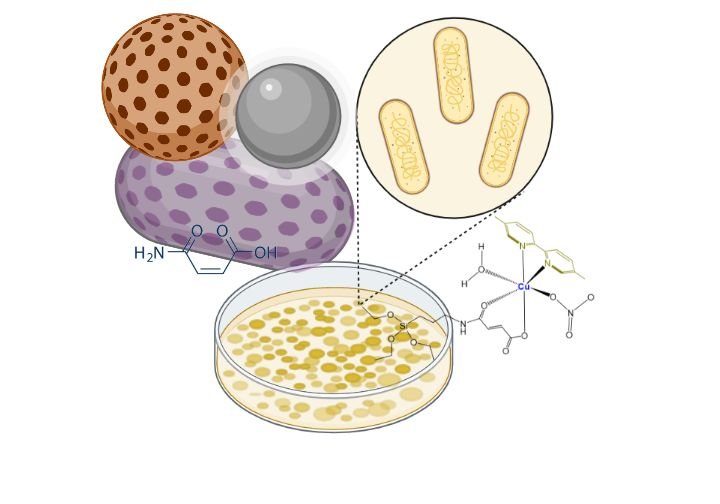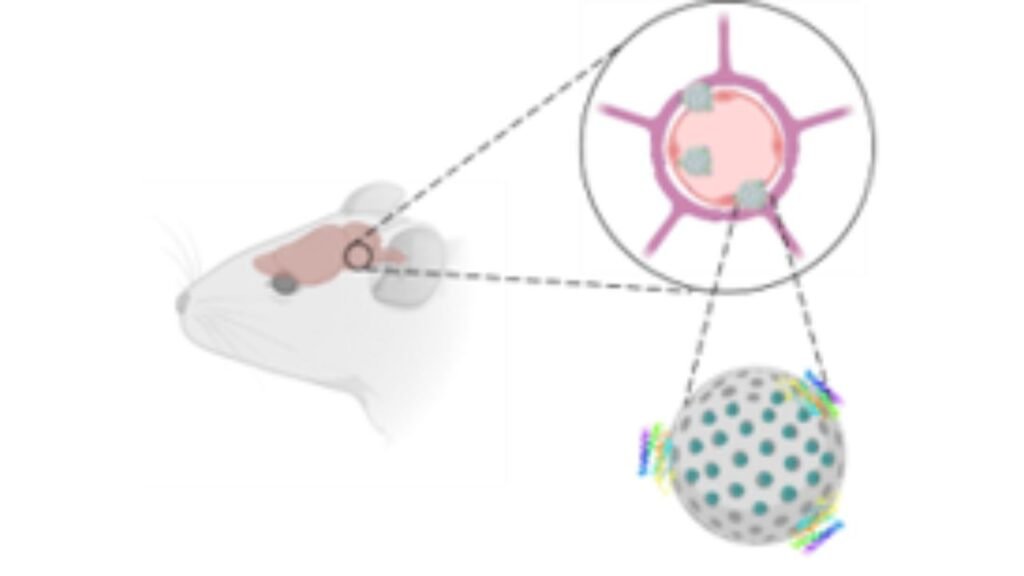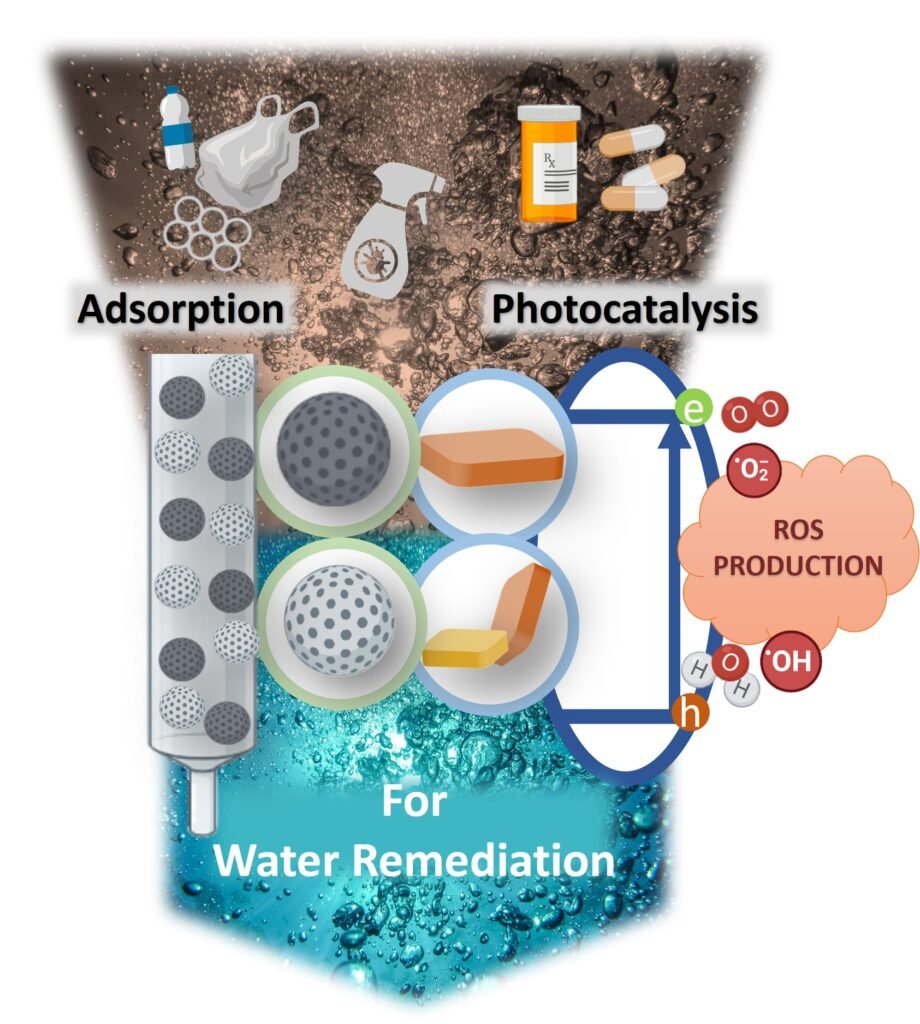Research
COMET-NANO group

New Multifunctional Nanomaterials for Cancer Treatment and Diagnosis
COMET-NANO specializes in the development of nanostructured materials for biomedical applications. These materials are distinguished by their high surface area, biocompatibility, and easy functionalization, making them ideal for cancer treatments. They allow the inclusion of metallodrugs and fluorophores, enabling the creation of personalized nanomaterials for each type of cancer.
Our group has over 20 years of experience in synthesizing nanomaterials based on oxides and other starting materials, and in exploring various combinations for their functionalization. We are capable of developing nanomaterials that diagnose and treat tumor areas simultaneously and selectively. We evaluate both the morphological and structural properties of these materials as well as their potential in in vitro studies. Additionally, COMET-NANO works on scaling methods to meet the demands of industrial-level research. We offer innovative and personalized systems for antibacterial treatments, covering all stages from synthesis to application.

Systems with Potential in Antibacterial Treatments
Similarly to the previously mentioned research, the COMET-NANO group focuses on developing innovative antibacterial treatments, essential due to the growing threat of superbugs. Our group investigates materials based on silicon oxides, silver nanoparticles (AgNPs), and copper complexes (Cu), leveraging the excellent antibacterial properties of AgNPs.
Our work goes further by creating hybrids of silicon nanoparticles and AgNPs in a core-shell configuration and functionalizing the latter in the pores of silicas, thus enhancing antibacterial selectivity and activity. We also employ silica nanoparticles and natural clays functionalized with Cu complexes to boost the effectiveness of clinical antibiotics.

Nanomaterials for the Treatment of Neurodegenerative Diseases
The research group also focuses on developing innovative treatments for neurodegenerative diseases, overcoming the blood-brain barrier challenge with silica nanomaterials and/or quantum dots. These systems improve drug distribution in the brain, effectively tested in mouse models with Amyotrophic Lateral Sclerosis (ALS).
Our approach optimizes synthetic processes and surface modifications of nanoparticles, achieving more efficient and selective administration than conventional treatments. This not only slows the progression of diseases like ALS but also improves the quality of life for patients. Pioneers in the use of functionalized mesoporous silicas, COMET-NANO offers advanced solutions for ALS and potentially for developing new treatments for other neurodegenerative diseases like Alzheimer’s or Parkinson’s.

Preparation of New Platforms for Water Decontamination
COMET-NANO leverages advances in nanotechnology to enhance catalysts at the nanoscale, essential in the chemical and environmental industries. We develop hybrid nanosystems based on silica, titania, carbon nanotubes, graphene oxide, magnetite, metallic nanoparticles, and bismuth-based materials, with improved catalytic and photocatalytic properties through green chemistry.
Success has been achieved in photocatalytic reactions, using different types of radiation, for the decomposition of organic contaminants in water, such as pharmaceuticals and dyes. Additionally, these materials are multifunctional, capable of performing various coupling, oxidation, and polymerization reactions. With extensive experience in metallic complexes and nanostructured materials, we design advanced platforms for applications in the pharmaceutical, food, and petroleum industries, as well as in environmental processes, improving both efficiency and sustainability.

Multifunctional Materials for Gas Capture and Transformation
With the aim of mitigating climate change, the COMET-NANO group has focused on preparing materials capable of capturing large amounts of CO₂ for subsequent valorization and, at the same time, having the potential to fix and transform N2. The group prepares different multifunctional platforms capable of capturing both gases, fixing them, and transforming them without the need to use multiple systems, employing starting materials with high surface-to-volume ratios and functionalizing them with specific organometallic complexes for the valorization of CO₂ and N2.
These versatile platforms will help reduce the greenhouse effect by decreasing CO₂ concentrations, producing other carbon-based fuels, improving current energy efficiency through the photocatalytic reduction of CO₂ to carbon monoxide or formic acid, and especially by transforming N2 to ammonia, a potential green fuel for energy production.
New Multifunctional Nanomaterials for Cancer Treatment and Diagnosis
COMET-NANO specializes in the development of nanostructured materials for biomedical applications.
These materials are distinguished by their high surface area, biocompatibility, and easy functionalization, making them ideal for cancer treatments. They allow the inclusion of metallodrugs and fluorophores, enabling the creation of personalized nanomaterials for each type of cancer.
Our group has over 20 years of experience in synthesizing nanomaterials based on oxides and other starting materials, and in exploring various combinations for their functionalization.
We are capable of developing nanomaterials that diagnose and treat tumor areas simultaneously and selectively. We evaluate both the morphological and structural properties of these materials as well as their potential in in vitro studies. Additionally, COMET-NANO works on scaling methods to meet the demands of industrial-level research. We offer innovative and personalized systems for antibacterial treatments, covering all stages from synthesis to application.
Systems with Potential in Antibacterial Treatments
Similarly to the previously mentioned research, the COMET-NANO group focuses on developing innovative antibacterial treatments, essential due to the growing threat of superbugs. Our group investigates materials based on silicon oxides, silver nanoparticles (AgNPs), and copper complexes (Cu), leveraging the excellent antibacterial properties of AgNPs.
Our work goes further by creating hybrids of silicon nanoparticles and AgNPs in a core-shell configuration and functionalizing the latter in the pores of silicas, thus enhancing antibacterial selectivity and activity. We also employ silica nanoparticles and natural clays functionalized with Cu complexes to boost the effectiveness of clinical antibiotics.
Nanomaterials for the Treatment of Neurodegenerative Diseases
The research group also focuses on developing innovative treatments for neurodegenerative diseases, overcoming the blood-brain barrier challenge with silica nanomaterials and/or quantum dots. These systems improve drug distribution in the brain, effectively tested in mouse models with Amyotrophic Lateral Sclerosis (ALS).
Our approach optimizes synthetic processes and surface modifications of nanoparticles, achieving more efficient and selective administration than conventional treatments. This not only slows the progression of diseases like ALS but also improves the quality of life for patients. Pioneers in the use of functionalized mesoporous silicas, COMET-NANO offers advanced solutions for ALS and potentially for developing new treatments for other neurodegenerative diseases like Alzheimer's or Parkinson's.
Preparation of New Platforms for Water Decontamination
COMET-NANO leverages advances in nanotechnology to enhance catalysts at the nanoscale, essential in the chemical and environmental industries. We develop hybrid nanosystems based on silica, titania, carbon nanotubes, graphene oxide, magnetite, metallic nanoparticles, and bismuth-based materials, with improved catalytic and photocatalytic properties through green chemistry.
Success has been achieved in photocatalytic reactions, using different types of radiation, for the decomposition of organic contaminants in water, such as pharmaceuticals and dyes. Additionally, these materials are multifunctional, capable of performing various coupling, oxidation, and polymerization reactions. With extensive experience in metallic complexes and nanostructured materials, we design advanced platforms for applications in the pharmaceutical, food, and petroleum industries, as well as in environmental processes, improving both efficiency and sustainability.
Multifunctional Materials for Gas Capture and Transformation
With the aim of mitigating climate change, the COMET-NANO group has focused on preparing materials capable of capturing large amounts of CO₂ for subsequent valorization and, at the same time, having the potential to fix and transform N2. The group prepares different multifunctional platforms capable of capturing both gases, fixing them, and transforming them without the need to use multiple systems, employing starting materials with high surface-to-volume ratios and functionalizing them with specific organometallic complexes for the valorization of CO₂ and N2.
These versatile platforms will help reduce the greenhouse effect by decreasing CO₂ concentrations, producing other carbon-based fuels, improving current energy efficiency through the photocatalytic reduction of CO₂ to carbon monoxide or formic acid, and especially by transforming N2 to ammonia, a potential green fuel for energy production.
